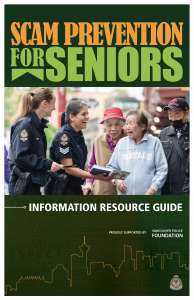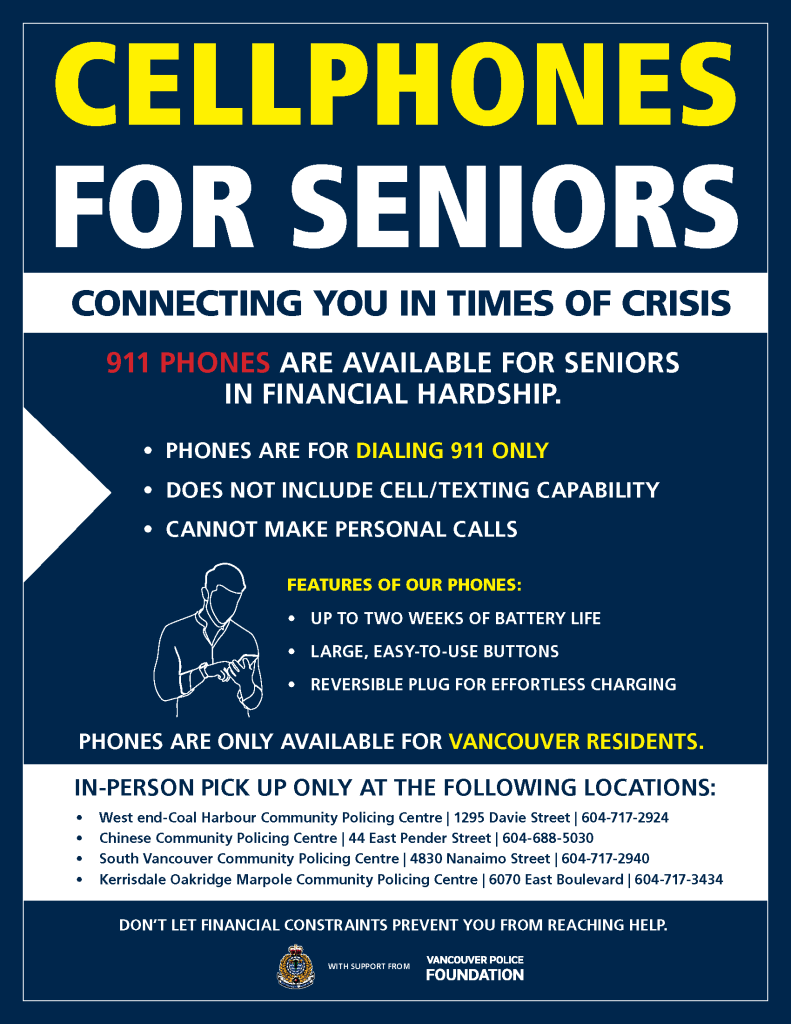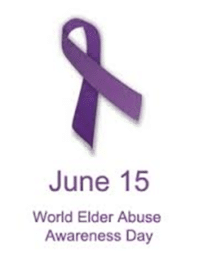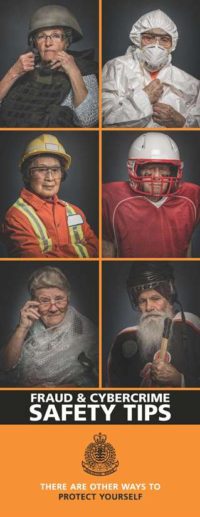Many seniors list “fear of crime” as one of their biggest concerns, even though statistics show that they are the least likely group to become victims of most types of crime.
However, when crime does happen, the consequences are often more severe for our older population. Many seniors live on a fixed income, so the loss of money or property is difficult to replace. As people get older, their bodies take longer to recover from injury, so an attack on a senior can have a more serious outcome than on someone younger.
There are steps that you can take to help prevent becoming a victim of crime.
Fraud
While many seniors fear physical attacks, they are far more likely to become victims of con artists. They may try to scam you in person, in a phone call, or in an email, and can be extremely charming and very convincing.
Learn more about fraud prevention and how to report fraud.
Scam Prevention Workshops for Seniors
If you’re interested in having the VPD Scam Prevention team present to a group of 50 or more, please email any of the following organizers to get more information or request a session. The topics include: bail scams, financial crimes, distraction thefts, and cybercrime.
- Sergeant Rita Raj
rita.raj@vpd.ca - Detective Constable Julie Gilmore
julie.gilmore@vpd.ca - Sergeant Rob Dairon
robert.dairon@vpd.ca
Upcoming Seminars
Check back soon for upcoming dates
Cellphones for Seniors in Need
Cellphones are so widely used today and it can be difficult for someone not to have one – particularly if you need emergency help. Many seniors in our community cannot afford to purchase a phone, which can make it hard to access emergency services, and to report crime or feeling unsafe or unwell.
Thanks to the Vancouver Police Foundation, the VPD can offer free cellphones to seniors in need to enhance their safety and well-being. The phones are designed to make outgoing calls to 911 only and cannot receive incoming calls or texts. They are easy to operate, and there is no monthly plan or cost.
Phone Features
- Batteries will last several days between charges
- Large, easy-to-read buttons, with audio read-out of numbers for people who find a screen hard to read
- Charger is included
Who is Eligible for a Free Cellphone?
Vancouver residents aged 55 or older (proof of residency may be required)
There is a limit of one phone per person.
Where Can I Get a Phone?
Call Sergeant Dan Cameron at 604-307-8358 or reach out to one of these community policing centres:
Chinese Community Policing Centre
44 E. Pender Street
604-688-5030
Kerrisdale Oakridge Marpole Community Policing Centre
6070 East Boulevard
604-717-3434
South Vancouver Community Policing Centre
4830 Nanaimo Street
604-717-2940
West End Coal Harbour Community Policing Centre
1295 Davie Street
604-717-2924
Testimonial
Thanks to the donated phone from the VPD, Mr. V. was able to reconnect with BC Housing, report his stolen ID, and attend crucial appointments. This single act of support allowed him to begin restoring stability in his life. He expressed deep gratitude, as the phone became a lifeline — especially given his mobility challenges.
Your donation had a real and immediate impact on a vulnerable senior, helping him regain independence and hope during a difficult time.
Elder Abuse
It can be difficult for most of us to imagine that anyone could abuse some of our most vulnerable citizens, but elder abuse is a growing problem in Canada.
While there are different types of mistreatment that seniors can experience, the Government of Canada defines elder abuse as:
“Any action by someone in a relationship of trust
that results in harm or distress to an older person.”
Financial
- forcing someone to change their will
- selling or giving away someone’s property with forced or no consent
- keeping money, such as a pension check, that belongs to a senior
No one has the right to do these things to you, even if you have given them power of attorney. They must act in your best interests not theirs.
Physical Abuse
- assault
- restraining someone for long periods of time, either by locking them inside, tying them down, or over-medicating them so they cannot get out of bed
Psychological or Emotional Abuse
- insults, threats, intimidation, or yelling
- not allowing certain rights and privileges, like seeing friends and family
- invading someone’s privacy by interfering with their mail, phone calls, or money matters
- denial of a safe environment, food and personal care, hygiene, medical and legal services
- preventing opportunities for worship
Common Warning Signs
One warning sign does not necessarily mean abuse, but here are some possible signs that there could be a problem:
- the onset of unexplained physical injuries, like bruising, sprains or broken bones
- a change in financial status
- abandoning / leaving a dependent elder alone for long periods of time
- a sudden change in the elder’s appearance
- bedsores, unattended medical needs, poor hygiene, and unusual weight loss are indicators of possible neglect
- belittling, threats, and other uses of power and control by spouses or those who should be in a position of trust, are signs of verbal or emotional abuse
- frequent arguments between the caregiver and elderly person
Tips to Help Prevent Elder Abuse
- become knowledgeable about the signs of elder abuse and neglect
- call or visit an elderly loved one and ask how they are
- help an elder obtain appropriate community resources
- provide the caregiver with a break
- contact your local public trustee to learn how you can support their work assisting at-risk elders
- ask your community leaders to speak about elder abuse
- volunteer at a nursing home or visit a homebound senior in your neighbourhood
If you, or any senior that you know of, are the victim of any type of abuse, please call our non-emergency line at 604-717-3321. If your immediate safety is threatened, please call 9-1-1.
Personal Safety Tips
- always be aware of your surroundings
- know where you are at all times
- walk with a friend or family member
- carry limited valuables and money on your person
- carry yourself with confidence
- protect your personal space
- be loud if you need help — don’t be afraid to shout or yell
- ask for photo ID from any service/delivery person you aren’t familiar with
- don’t hesitate to call police if you need assistance
Financial Safety Tips
- protect your personal information
- don’t send money to anyone if you aren’t certain of their identity
- say no when someone pressures you for money – even family members
- advise your bank of any authorized users of your account
- choose a trusted family member or friend as a power of attorney
- if it sounds too good to be true, it probably is
- never provide your credit card, social insurance, or banking information over the phone
- don’t let anyone rush you into signing anything – read carefully and have someone you trust check it over
- if you are suspicious about anyone, contact the police, the Better Business Bureau, or the Canadian Anti-Fraud Centre
Home Invasion Robberies
Home invasions are not common in Vancouver, but they can have serious consequences. If you are a victim of a home invasion, try to cooperate as much as possible. Your possessions are not worth your health or your life.
Try to remember any distinguishing features of your assailants to share with police afterwards, and call 9-1-1 as soon as it is safe to do so.
There are certain precautions you can take to limit the chance of becoming a victim:
- keep your doors locked at all times – if there is a knock at the door, verify the identity of the person through a peephole there before you open it
- make sure your door is made of solid wood or metal – a door is only as strong as its frame, so install a metal frame or have the current frame reinforced
- place a security film or Plexiglas on the inside of the window, as it increases the difficulty in breaking the glass
- take your phone with you to the door when someone knocks
Contact your local community policing centre for more information on how you can help prevent crime.
Purse Snatching Robberies
Purse snatching is one of the few crimes were seniors are targeted more than other age groups. If you must carry a purse, here are some tips to help prevent becoming a victim or to limit injury if you are victimized.
- walk with your head up high and with a sense of purpose – attackers are looking for someone they consider easy prey
- carry keys and identification in your pocket, so that if your purse is stolen the thieves won’t have your address and access to your home
- avoid carrying large amounts of money
Learn more about personal safety.
Where to Get Help
Police Emergency 9-1-1
Police Non-Emergency
604-717-3321
BC Centre for Elder Advocacy and Support
(Seniors Abuse and Information Line – SAIL)
(604) 437-1940
1 (866) 437-1940
Vancouver Coastal Health
(604) 263-7377
Public Guardian and Trustee
(604) 660-4507
Victim Link BC
1-800-563-0808
Mosaic Victim Services Program
604-254-9626
Qmunity
604-684-5307
Vancouver Community Policing Centres
Office of the Seniors Advocate
1-877-952-3181
Government of Canada
1 (800) 622- 6232
Government of Canada
Department of Justice
Elder Abuse is Wrong
Healthlink BC
8-1-1
Nidus.ca
Personal Planning Resource Centre and Registry






